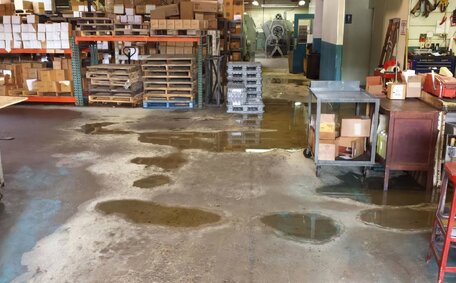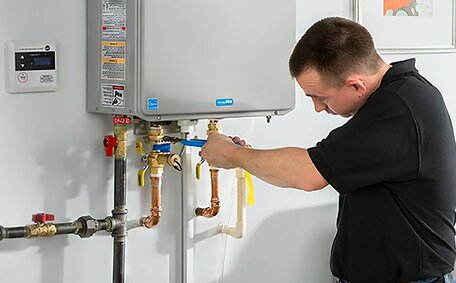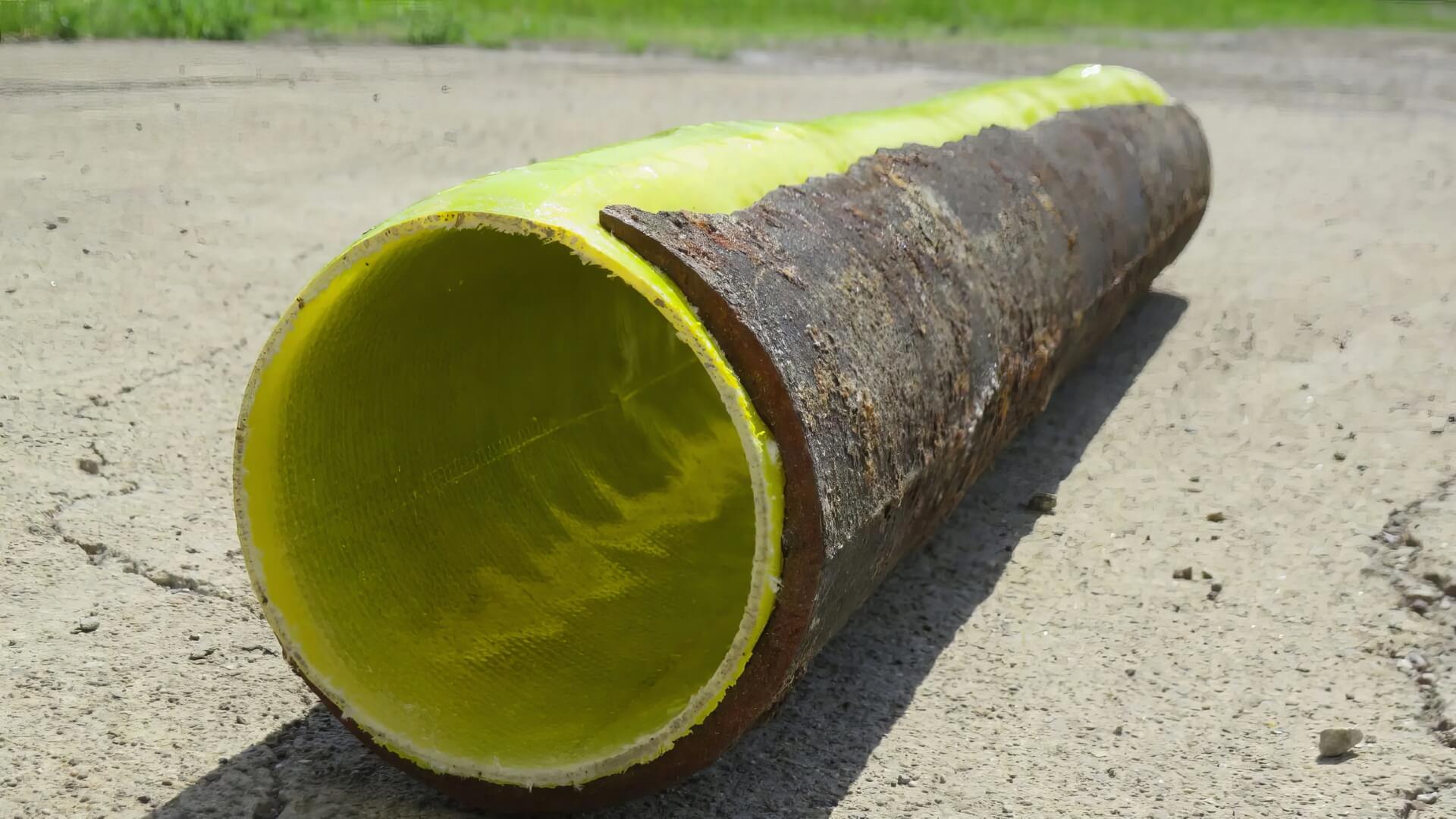
How To Fix Water Heater Issues
Can’t get hot water from your water heater? Try troubleshooting by checking the power supply, thermostat, heating elements and more. Call a pro plumber for repairs.
Read MoreBlocked sewer drains are common and if left unchecked, can seriously damage your home’s plumbing. If ignored, a blocked sewer line can result in an overburdened sewage system, unpleasant smells, and harm to walls, floors, and foundations.
Debris clogging the main sewer line can lead to waste and water backing up through drains and toilets, potentially causing indoor flooding.
Blocked sewer lines can result from multiple factors, including tree root infiltration, grease, and fat build-up, excessive toilet paper, pipe collapse, and soil movement. Warning signs of a clog include gurgling drain sounds, slow drainage, sewage smells, and pooled water.
Baulkham Hills Plumbing is an expert in diagnosing and clearing blocked sewer lines in Baulkham Hills, Yarra Valley, and Inner West Sydney. We provide Sydney water and 24 hours day 7 emergency plumbing services to quickly restore proper sewer functioning.
Our licensed plumbers are equipped with the necessary tools and expertise to diagnose sewer drain issues, locate blockages in wastewater pipes, and clear obstructions using methods such as hydro jetting, electric eel machining, and CCTV drain inspections.
Preventive measures are essential for avoiding sewer blockages. Periodic professional inspection and cleaning of main sewer lines can help mitigate this risk significantly. Trimming tree roots away from pipes also contributes to obstruction prevention.
Minimising grease and solids while washing dishes and being cautious about flushing only appropriate items down toilets can help keep your kitchen sink clear.
Don’t wait for your drain to reach a point of emergency; have a plumber investigate promptly with a thorough inspection. For expert assistance, reach out to Baulkham Hills Plumbing today for in-depth information on our sewer cleaning and repair services.
Blocked sewer lines are typically caused by several common factors:
Wet wipes, sanitary products, and cooking grease are infamous for causing household sewer blockages. It’s best to avoid flushing or pouring these items down drains.
Should you suspect a blocked sewer line, it’s imperative to call a licensed plumber to identify the cause and reinstate proper drainage. DIY attempts may increase the costs and cause further damage.
Tree roots can cause blockages by infiltrating sewer pipes through small cracks, joints, or damaged areas. Attracted to the moisture and nutrients in wastewater, the roots can grow and constrict the flow inside the pipes.
As roots grow thicker and larger over time, they encroach on the interior space of sewer pipes. This leads to restricted water flow, backups, and eventual blockages. Tree roots can fully clog pipes and rupture older sewer lines made from clay or cast iron.
Tree root invasion needs professional intervention. Plumbers have specialised tools like hydro jetting, mechanical rodding, and root cutting to remove root masses and clear fully blocked pipes down your sewer line. They can also carry out inspections on lines to identify cracked sections invaded by roots, where information can be vital for determining the need for repair or replacement.
Grease and fat poured down sinks and drains are a major contributor to sewer clogs. Oil, grease, and fat from cooking have a tendency to coat and cling to the insides of pipes. Thick grease deposits can accumulate over time, narrowing sewer pipe interiors.
As more grease is washed down, it can then stick to these fatty deposits. Eventually, the grease layers completely clog pipes and impede water flow. Grease solidifies and hardens when cooled, making grease blockages extremely difficult to dislodge.
Food scraps washed down using water your kitchen sink provides make the situation worse. Bits of food get trapped in the grease layers, accelerating the accumulation. When using water on your greasy pans and cooking equipment, they should be wiped clean with paper towels before washing.
The best way to avoid grease-related sewer clogs is to refrain from pouring oils and fats down sinks and drains.
Installing a grease trap with advanced features can help catch fats, oils, and solids, preventing pipe blockages. Regularly cleaning sinks and drains to remove accumulated grease is also beneficial. If you suspect a blockage from grease buildup, it’s essential to contact a professional plumber promptly.
Toilets are only designed to flush human waste and toilet paper, which we highly recommend adhering to.
There are several clear symptoms that indicate your sewer line is blocked:
If these signs appear, it’s important to consult a professional plumber quickly. They can pinpoint the issue and apply techniques such as hydrojetting, drain augering, or camera inspections to resolve the blockage.
Make sure to take steps to avoid costly backups in your drainage system. regular drain cleaning, limiting grease and solids sent to sewers, and professional inspections can fix your potential sewer problems before they turn into major obstructions.
When multiple drains in your home are sluggish or completely clogged, this is a strong indication of a main sewer line clog. With Sydney blocked drains experience, the main sewer line obstruction can cause waste and sewage to back up through home fixtures. Instead, it backs up through all connected drains and fixtures.
When the main sewer line is blocked, you may notice slow draining or complete clogs in sinks, bathtubs, showers, and floor drains. Toilets may fill with water unexpectedly, overflow or make gurgling noises. Foul sewage odours may emanate from drains as well.
With multiple drain clogs throughout the home, it is important to contact a professional plumber to inspect the main sewer line. With multiple drain clogs throughout the home, it is important to contact a professional plumber to inspect the main sewer line.
Attempting to clear individual drains is unlikely to solve a major blockage in the main line.
Left unaddressed, your plumbing system can be impacted and damaged by a blocked main sewer line. Have a plumber inspect all drains and ensure your sewer connection and make any necessary repairs to restore proper drainage and prevent hazardous waste backups.
Hearing gurgling noises emanating from sinks, tubs or toilet bowls often signals a blockage in the main sewer line. As water attempts to drain past a clog or obstruction in the pipe, air bubbles are forced through the narrow openings, creating a burbling or gurgling sound.
Gurgling happens when sewage tries to push through a partially blocked pipe. Air trapped by a blockage in your pipe can create gurgling noises as it forces its way past the debris. The sounds get louder as the blockage gets worse over time, which is a troubleshooting tip pointing to immediate attention.
The line clog impedes the flow, causing backups.
Sewer gases can also get trapped and make glugging noises when trying to pass through a severely blocked drain. Gurgling during or after flushing toilets or using sinks and tubs is a telltale sign of trouble requiring immediate professional attention before plumbing damage or overflow occurs.
Unpleasant sewage odours around your home or yard may indicate a blockage in your main sewer line. When obstructions prevent wastewater from properly flowing out, sewer gases can back up through drains and vents. The stench that came out from hydrogen sulphide gas produced by sewage decomposition.
Foul smells in areas such as bathrooms or laundry rooms may indicate poor drainage from sinks, showers, tubs, and floor drains. Sewage odours near your toilet may also occur when blockages cause gases to come out. Outside, you may detect unpleasant smells around sewer vents or lawn areas where sewage has surfaced.
If manifold drains throughout your home emit foul odours, this points to a whole-home clog. Call a professional plumber immediately to diagnose the issue. They can employ camera inspections and high-pressure hydro jetting to remove blockages and eliminate unpleasant sewage smells.
For minor household clogs, a plunger or drain snake can be used to unblock drain obstructions. Plumbers have powerful equipment like high-pressure hydro jetting machines that blast water to dislodge debris, cutting electric augers that grind through obstructions, and CCTV cameras that precisely locate blockages. For reliable blocked sewer line cleaning and repairs, hire a licenced plumber with expertise in the latest methods.
However, severe main sewer line blockages often require professional drain cleaning services. Your plumber can also employ pipe relining or spot repairs if needed. Attempting risky DIY fixes can damage your plumbing and allow raw sewage into your property, which entails calling a blocked drain plumber with expertise.
For minor clogs, homeowners can attempt DIY methods, though professional drain cleaning is recommended for significant blockages:
For thorough drain cleaning or cutting tree roots, a plumber with professional tools is necessary, available 24/7. Attempting to clear deep sewer clogs without the aid of professional drain plumbers risks further damage and sewage backups. Contact a licenced plumber if DIY methods are unsuccessful.
While minor drain clogs may be manageable with DIY techniques, significant blockages in the main sewer line necessitate professional tools and expertise. An experienced, licenced plumber has specialised tools to accurately diagnose and resolve blocked sewer lines.
Hydrojetting proved to be very effective as a method plumbers use to clear a blockage your sewer might have and remove debris. It involves blasting high-pressure water through the blocked sewer pipe to dislodge and flush away obstructions. CCTV drain cameras assist in determining the precise location and cause of blockages.
For stubborn blockages, a high-pressure water jetter with rotating cutting heads can grind through and break up material.
Professional drain cleaners use high pressure water jetter machines, mounted on their trucks, that generate up to 5000 PSI of water pressure. They can also access pipes through cleanouts and vents, reaching each connection point, allowing them to thoroughly clean the entire sewer line from different entry points.
When determining who responsible for pipe damage from tree roots, plumbers can employ specialised rodding machines and root-cutting tools to remove invasive roots and repair lines. Expert companies also offer a permanent solution like trenchless sewer line replacement if ageing pipes are beyond repair.
Don’t wait for a sewer overflow emergency. Schedule regular professional drain inspections and cleanings to keep your pipes clear. If you suspect a serious clog, trust the sewer specialists at Baulkham Hills Plumbing to diagnose the issue and restore normal drainage with advanced methods.
While minor clogs may be remedied with DIY methods, it’s crucial to contact a licenced professional plumber for serious sewer line issues. At Baulkham Hills Plumbing, our experts are on call 24 hours day to address blocked drains and sewer backups throughout Sydney.
Call your Sydney plumber immediately if you experience:
Our licenced plumbers have the high-powered hydro jetting equipment and expertise for successful drain clearing, even with the most severe blockages. We also conduct drain camera inspections that fixed our customers’ issues by pinpointing problems. If replacement is needed, we offer efficient trenchless sewer line repair and installation.
Don’t wait - following an expert’s advice is essential as serious sewer clogs can quickly escalate into overflowing waste backups. Trust Baulkham Hills Plumbing’s experts to restore flow and prevent damage to your Sydney property. Call 1300 349 338 or email [email protected] for our professional drain cleaning services 24/7.
There are several preventive measures homeowners can take to help avoid future blocked sewer lines:
Take preventive action to avoid the high cost to clear blocked sewers before blockages occur. Baulkham Hills Plumbing can conduct sewer scoping inspections and provide professional maintenance to keep your pipes clear. Contact us at 1300 349 338 to prevent costly backups down the line.
Items like diapers, sanitary products, cotton swabs, cigarette butts and condoms can easily snag and clog pipes. Flushable wipes contain fibres that do not break down and accumulate into obstructions.
All other waste should prompt you to call plumber advice before it causes blockages. Install sink strainers to catch food debris.
Regular sewer line maintenance and inspection by qualified professionals is crucial to prevent blockages. Plumbers recommend the following maintenance tips:
Sewer lines that go years without maintenance are prone to obstructions. By taking preventive measures and having your sewer system regularly serviced by professionals, you can avoid costly backups and damage from avoidable drain clogs down the line.
Can’t get hot water from your water heater? Try troubleshooting by checking the power supply, thermostat, heating elements and more. Call a pro plumber for repairs.
Read MoreCloudy or milky hot water coming from your taps is generally harmless and caused by trapped air bubbles in the water. Simply running the tap for a little while will usually clear up the water. If the cloudiness persists, it could be caused by sediment buildup or issues with your pipes.
Read MorePipe relining involves inserting a tube inside damaged pipes to repair cracks and leaks without digging. This trenchless method may allow pipes and plumbing fixtures to be relocated during bathroom renovations. Contact our expert plumbers to understand if pipe relining can reposition your pipes and fixtures.
Read MoreBaulkham Hills, 2153 NSW
We will call back as soon as possible.




